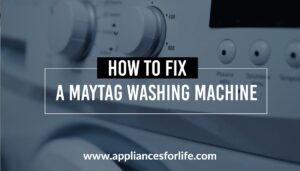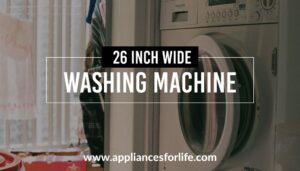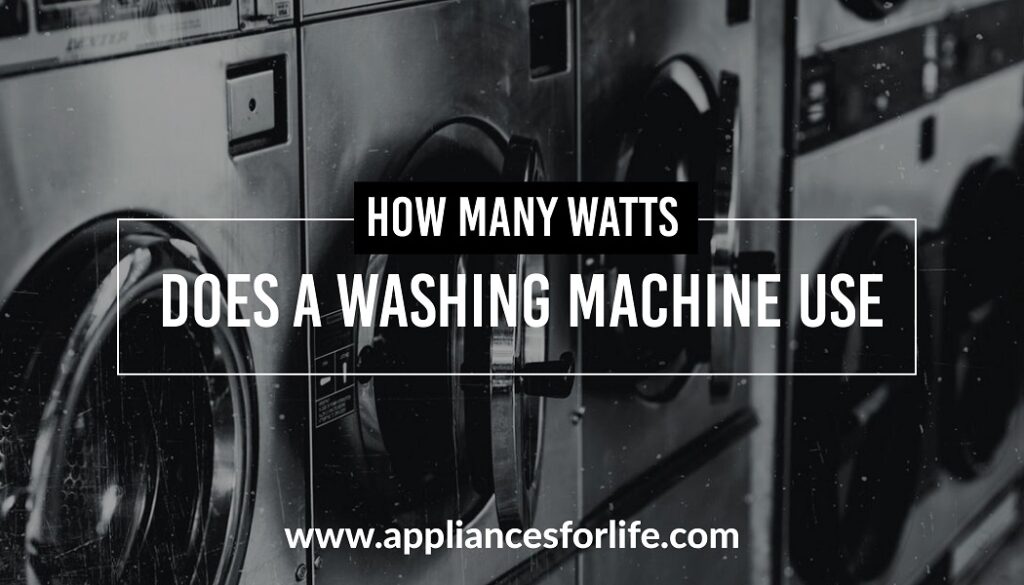- Using a washing machine may seem so direct and without complications, but you’ll be wrong to think you know all there is to be known about your machine already. If the question ‘how many watts does a washing machine use’ has ever popped up in your mind, then this is the article to read.
- Also, a lot of people don’t know what it takes for a washing machine to be efficient all-round. To some people, when a washing machine can do the job efficiently, it doesn’t matter how much power it consumes or how much water it uses, they think it’s cool. This article also discussed the things that make a washing machine efficient.
- Lastly, if you’re looking to get a new washing machine, the worst mistake you can make is going on the market without a clear idea of what you want to get. We’re also going to be looking at the 5 important factors to consider when purchasing a new washer.
Washing machine power rating isn’t something most people pay attention to, but, at the end of the day, everyone still wants an energy-efficient machine that won’t have a huge impact on their monthly electricity bill at the end of the month. We can’t deny how important washing machines are to every household, and the fact that they bring so much convenience into our homes is enough for people not to mind spending hundreds and thousands of dollars on them, especially the high-end ones that come with tech-inspired features. Knowing how many watts the washing machine use will not only make you aware of how your washing machine operates; it’ll also give you a chance to properly manage your machine to be as efficient as you want it to be.
Table of Contents
ToggleUsing a washing machine comes with a lot of things as you’ll need to get familiar with how the machine operates before you now identify the best ways to maintain the machine such that it will serve you for a long time. Efficiency, energy, or functionality, is a big factor to consider when purchasing a washing machine today, and even if the washers available now are not as bad as the ones that were made 10 years ago in terms of efficiency, you still need to be careful when choosing the ideal washer for your laundry room. Washing machine energy use, or washing machine energy consumption as most people love to call it, is one of the driving forces behind a user’s final decision to opt for a washer.
The sad thing about those who use washing machines these days (and there are a lot of them) is that they don’t pay enough attention to how their washers operate or the things these machines need to continue to function at the highest level. If a washing machine is not energy-efficient, you will feel the effect on your pocket because you’ll be forced to spend more money than you’re supposed to all because the washing machine consumes more power and water. However, you can avoid these things if you do your homework right by studying the washing machine in question enough before you put your money on it in the first place.
If you want to know how much energy each appliance in your house consumes, we’ve prepared a detailed article for how many watts different appliances in the house consume; you can check it out here.
Every electric appliance in the world today needs to be powered by electricity, except if there’s an exception where the machine can also use solar power to function without electricity. Everything comes at a cost, and the fact that we’re already spending a lot of money to acquire these appliances doesn’t mean we won’t spend some more to maintain them and keep them in the best shape possible so they can last for a long time. On the other hand, we also have to be worried about how much energy and resources these appliances consume so we can also take that into account to know if using the appliances is worth it or not.
Whatever amount you spend acquiring a washing machine and maintaining it, the best way to ensure that it’s worth it is by paying attention to those special details, including, in this case, the cost of running a washing machine. According to Direct Energy, having a washing machine in your laundry room is “an indispensable convenience” that will take a lot of domestic burdens off your shoulder if you put it to good use. If you compare the cost to run a washing machine to what you have to spend to have your laundry done at your local laundromat, you’ll realize having a washing machine in your home will do you a lot of good.
With energy consumption playing a big part in people’s decision to opt for a washing machine, we’re not surprised that most of the questions people ask when they want to be sure of what they’re getting themselves into include ‘how much watts does a washing machine use,’ ‘how many watts does a washing machine use per hour,’ ‘how much electricity does a washing machine use,’ and many others. What we know is that energy consumption depends on the type of washer, how it’s used, and how often it’s used. You will always get your answers if you put all the important factors into consideration, and perhaps you’ll also be able to save yourself a lot of money in the process.
If you’re prepared to start running your washing machine and other household appliances on an inverter, knowing just how much power each appliance consumes will help you save a lot of money as you’ll know what appliances you can run conveniently on your inverter and which ones to avoid. According to Let’s Save Electricity, two major components play a huge role in the power consumption of any washing machine and they are the electric motor and the heating equipment responsible for providing hot water mix for cleaning. The most powerful of the two is the heating equipment because it consumes about 70% of the total power consumed while the electric motor that helps spin the washing machine drum only consumes 30%.
The same study shows that a 7k washing machine needs a maximum power of 2000-2500 watts to be used with the hot water mix for efficient cleaning. With the share of power each component has, you can tell that the electric motor will consume about 500 watts of the total power consumed. With the information provided by the washing machine manufacturer, which is usually located on the website or the user manual, you can accurately calculate the total power consumption of your washing machine using the formula we’ll be discussing later in this article.
Oftentimes, you can also find the overall rated power of the electric motor in the washing machine and the entire washing machine on the silver label that is located at the back of the washer. Knowing the power rating of your washing machine will help you avoid a lot of problems as you can now calculate the running cost of the appliance over the next few years and if it’s worth it. Some of the other factors responsible for the power consumption of your washing machine include automatic valves, digital control panels, and water pumps.
Calculating the Energy Consumption of your Washing Machine
As opposed to what many people believe, the washing machine doesn’t consume much power and that’s one of the best things to know about the appliance. We live in the modern age where almost all the appliances in production are energy-efficient, making us spend less on electricity bills at the end of the day. However, this doesn’t mean that you can’t make the mistake of buying a washing machine that consumes so much energy that it will eventually tell on what you have to pay for electricity at the end of the month or year. The surprising thing is that a washing machine doesn’t use as much energy as a dryer, which is why it’s more popular.
An average Energy Star washing machine runs on an average cycle for about 30 minutes, which, technically takes 500 watts per hour to run. So, for those 30 minutes, the machine will use 2.25kWh or 250 Wh of energy to run. If you use the washing machine like this every day for a year, the total electricity costs will stand at about $11.21.
We stated earlier that the two major components responsible for the power consumption of a washing machine are the heating equipment and the electric motor that helps rotate the drum in the washer when it’s washing, rinsing, or spinning. The general formula for calculating the power consumption of a washing machine or any other electrical appliances is: Rated Power (kW) x Operation Hours (hours) = Power Consumed (kWh). We’ll be giving two cases of power consumption according to the information provided by Let’s Save Electricity, with one including the heating element and the other not including the heating element.
Case 1
If you’re using a 7kg washing machine with an active heating element to clean efficiently, you should be prepared to have the washing machine consume more power. The 7kg washing machine with hot water will have a rated power of 2000 watts which is equivalent to 2kW of power when converted. If you use the washing machine for 1 hour, it must have consumed 2kWh (2 units) of electricity because the rated power is multiplied by the operation hour; i.e. 2kW x 1 hour = 2kWh of electricity.
Case 2
This second case involves the same 7k washing machine, but without the heating element being put to use because the washer is being used with normal water. If the washing machine has rated power of 500 watts – which is the same thing as 0.5kW which is the standard key to get the calculations right – and is used for 1 hour, the total consumption will be 0.5 kWh of electricity. To break it down, 0.5kW x 1 hour = 0.5kWh (0.5 unit) of electricity.
As seen in the two instances given above, if you use your washing machine to heat the water before it starts washing your clothes, the 7kg washing machine will consume 2 units of electricity in just 1 hour. In the second case, the washing machine is operating without hot water, which means that the heating element is not active, and it only consumes 0.5 units of electricity in an hour. Like we said earlier, one of the two major factors that affect the power consumption of a washing machine is the heating element, and once you activate it, it’ll be responsible for 70% of the power consumed by the washing machine when it’s operating.
Calculating the Electricity Bill for your Washing Machine
At the end of the day, what this knowledge will do for you is to make you know how much you’re spending on your washing machine as far as energy consumption is concerned. Knowing how many watts your washing machine consumes will lead you to the amount of money you’re also spending on electricity, so you can be aware of the situation and have it under control if you think you’re overspending. The standard equation for calculating the electricity bill for your washing machine is; Power Consumed x Electricity Tariff = Amount of Electricity Bill.
Bringing back the first case in the two instances we cited earlier if your washing machine consumes 2 units of electricity per hour (that is when you’re using hot water) and your electricity tariff is $0.20/unit, then;
2 units of electricity (power consumed) x $0.20 (electricity tariff) = $0.4.
This means that if we had used the second instance with your washing machine not using the heating element to provide hot water, we would have gotten a slightly lesser value. This is to show that the more power your washing machine consumes, the more money you’ll have to pay on your electricity bills.
Breaking Down a Washing Machine’s Efficiency Into 3 Factors
Whenever we talk about efficiency, not just the washing machine now, people always limit it to energy consumption, which means that they judge a machine’s efficiency by how much energy it consumes, which is wrong. Energy efficiency is not the only way to determine whether or not a washing machine is efficient because there are other factors involved, which we’ll be looking at below. The three important factors that determine how efficient a washing machine is include;
- Energy efficiency
- Water efficiency
- Technical efficiency
A washing machine’s energy efficiency plays a big role in people’s decision to opt for it because people care a lot about the running cost of a washing machine, which includes the electricity bills that have to be sorted out to keep the power up in the house. Thankfully, most of the washing machines in production today are Energy Star models, which means that they’re more energy-efficient compared to the washing machines that were produced some years back. When a washing machine is energy-efficient, you won’t have to spend a lot of money on your electricity bills because the cost of running the machine electrically won’t be much.
On the other hand, water efficiency also plays a big part in people’s decisions; it’s safe to say that it’s just as important as energy efficiency. If a washing machine consumes a lot of water, you’ll also find yourself spending more money on water than you have to, although that depends on where you live. If you’re purchasing a washing machine, you need to ensure that you’re getting the one that doesn’t consume much water.
We have a detailed article on how much water washing machines consume. You can check it out here.
Lastly, another factor you should consider when purchasing a washing machine is technical efficiency. Oftentimes, people ignore this factor and focus on the other two factors because they believe those are the most important. However, without this, what’s the point of getting a washing machine in the first place? You need to be sure the washing machine you’re buying has enough features to do your laundry as efficiently as you want so you can get the best value for your money.
What Are the Other Factors You Need To Consider When Purchasing A Washing Machine?
The other factors to consider when purchasing a new washing machine for your home include;
- Special features
- Budget
- Dimension
- Size of your laundry room
- The capacity of the washer
- Washing machine type
Frequently Asked Questions
1. How much power does a washer use?
To know how much power your washing machine consumes, you need to use a simple equation to calculate the result. Using the rated power, you can get the power consumed by multiplying the operation hour by the rated power.
2. Does washing machine use a lot of electricity?
If you manage to get an energy-efficient washing machine, you shouldn’t be spending a lot of money on your electricity bills because the washing machine won’t consume a lot of power.
Wrapping Up
Having a washing machine in your laundry room will undoubtedly save you a lot of stress. However, you should also be prepared to learn a lot about the washer if you want it to serve you for many years, including how much power the machine uses. This knowledge will help you calculate how much money you’ll spend on electricity bills and if you’re putting the machine on an inverter, you’ll have a better understanding of how to go about it.
25 MINUTES
ESTIMATED TIME DESIGNING AND UPLOADING THIS ARTICLE
10 HOURS 26 MINUTES
ESTIMATED TIME RESEARCHING AND WRITING THIS ARTICLE
You Might Also Like

How to Use a Frigidaire Washing Machine?
If you own a modern Frigidaire washing machine, chances are that you haven’t been exploring the washer’s features, and perhaps you’ve only limited yourself to the Normal cycle. In our Frigidaire washer guide, we’ll be discussing some Frigidaire washer instructions and how to use a

Automatic Washing Machine that makes Laundry fun: The Best in the Market
In the world we live in today, washing machines have become an integral part of every home because they make washing easier and more convenient for people; saving them time and efforts in the process. In a world that is evolving into a fully fledged

How to fix a Maytag washing machine
Maytag Bravos washers are named the number one top-load washer by a leading consumer magazine. They are high-efficiency washers recognized for the largest capacity in the industry and some of them can wash up to 18 pounds of laundry per load. These qualities and more

What To Put And Not Put In Washing Machine?
As one of the most important appliances in the house, knowing how your washing machine operates and how to best care for it will always come in handy. In this article, we’ll be exploring what to put and not put in washing machine to give

Top 3 Best 26-inch Wide Washing Machines
With washing machines getting very popular with each that passes by, we’re not surprised that people are looking to explore all the available options that are suitable for them. People that love portable washers have been on the look out for the best 26-inch wide

9 Signs You Need a New Washing Machine
Everything in life has an ending, good or bad, and your washing machine is not an exception. No matter how much you love your washing machine – some people even bond with their washers a lot over the years – you should be prepared to

How to Remove Stickers from Appliances
Sometimes, appliances are better off with decorative stickers but not everybody understands that, especially people with young kids at home. In this article, we’ll be looking at how to easily remove these stickers from your stainless steel appliances. The new appliances coming through the ranks

Top 5 Best Washing Machine Cleaner for Front Loader and Top Loader
The washing machine is so delicate that if you don’t use the right cleaners, you’ll damage your clothes and even the washer at some point. To avoid that, we’ll be looking at the top 5 best washing machine cleaners for front loaders and top loaders

Top 6 Best Washing Machines for Second Floor
If you live on the second floor of an apartment, you need always to have things for the convenience of others. In this article, we’ll be exploring the best washing machines for the second floor of an apartment. Top 6 Best Washing Machines For

Top 4 Best Washing Machines for Comforters
Domestic washing machines are more robust than most people think. If you’re looking for the best washing machines for comforters, we’ll be reviewing the best washers for comforters in this article. Top 4 Best Washing Machines For Comforters Comparison Table Since they introduced residential


